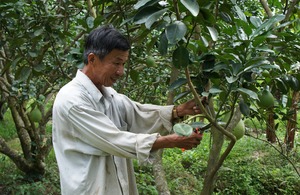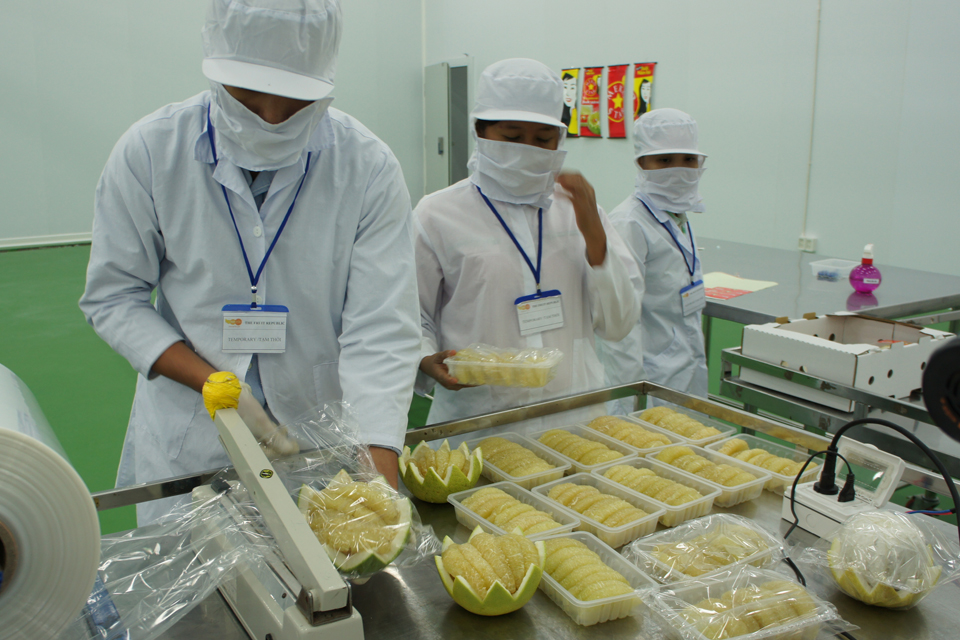Farming pomelo in Vietnam
How a challenge fund is helping Vietnamese farmers move their products up the value chain

Em using new farming techniques to look after his pomelo farm. Picture: DFID
Sixty five-year-old Le Ngoc Em is a pomelo farmer in Binh Minh district, Vinh Long province, Vietnam. He has been growing pomelo, a variety of grapefruit native to south east Asia all his life but recently, thanks to the Vietnam Challenge Fund supported by UK aid from the Department for International Development (DFID), Em realised that growing pomelo could be a serious profession. By following international standards and agro-techniques, Em found out he could add value to his produce and receive an extra income.
Farming by practice
The pomelo is native to Southeast Asia where pomelo farming experience is passed down from generation to generation. For Em and many other pomelo farmers in the Mekong delta, growing up and planting pomelo to earn a living was just second nature.
“Our land is quite fertile, and we thought that we already had lots of experience in growing pomelo. We harvest two times a year, and the income was enough to make ends meet”, says Em. “Our biggest worry then was the traders, who only bought first class pomelo, leaving the rest for us to sell as retail at a very low price. In addition, the price the traders offer varies making our income very unstable”, he added.
Becoming a professional farmer
Em’s worries were resolved when the Vietnam Challenge Fund (VCF) supported a fruit processing company in the area to set up the first international standard fresh-cut production line of fruit in Vietnam, for both domestic and export markets. The company signed a contract with Em to buy produce from his whole farm at a fixed price every six months. While first class pomelos are sold as they are, the rest will be peeled and packed in the new production line, making it easier for consumers to enjoy.

Fresh-cut production line, partly funded by UK aid, processes pomelo for both domestic and export markets. Picture: DFID
“This is a very straight forward way to do business, and I can know exactly how much I earn,” says Em.
More importantly, with financial support from VCF, Em was trained in agro-techniques to improve the productivity of his farm. He learnt how to prune the trees and use insecticide properly. He was also instructed to tidy up the farm to protect the environment. He started to meet with other farmers every month to share new farming experience and he soon realised that farming could be a serious profession. Amazingly, Em is now Global Good Agricultural Practices (GAP) certified, meaning his produce has been farmed using good agricultural practices, thus ensuring he meets the standards for exporting to the most demanding markets.
Expanding business opportunities
At the age of 65, Em is very excited with the new farming techniques he has adopted. Last year, his income increased by around 70%, reaching 200 million dong (around £6,500). He can now spend all his time looking after his pomelo farm as the fruit processing company takes care of harvesting work, and he no longer needs to do any retail sales at the local market.
Together with Em, 75 farmers in the area have received support from the VCF programme and obtained GAP certification. They are among 150 farmers who have signed contracts with the fruit processing company to sell their whole farm on a fixed price basis. On average, their income has improved by at least 70%. More importantly, the market is now very open, and with the Global GAP certification their pomelo can be exported to many countries, such as the Netherlands, Germany, Russia and Denmark, as a high quality product.
Film: See how the VCF is changing the lives of the poor in Vietnam
Film: See how the VCF is changing the lives of the poor in Vietnam
Facts & stats
The Vietnam Challenge Fund (VCF) is one of the two main components of Making Markets Work Better for the Poor (M4P) - a programme funded by UK aid and administered by the Asian Development Bank (ADB). Visit www.markets4poor.org for further information.
Launched in late 2009, VCF has been supporting 11 innovative projects proposed by the private sector that involve and benefit the poor.
The Pomelo project in Can Tho was among these projects. Initiated by a fruit processing company, the project aims to develop a higher value of the Vietnamese pomelo for export to international markets. It has built the first integrated fruit packaging house with HACCP-certified fresh cuts facility in Vietnam. It also helped train pomelo farmers to obtain and maintain Global GAP certification.
So far, 75 farmers have trained and achieved GAP certification, 150 farmers have signed contracts with the company to sell their whole farms, and on average, income of these farmers have increased by at least 70%.
See other porjects UK aid is supporting in Vietnam